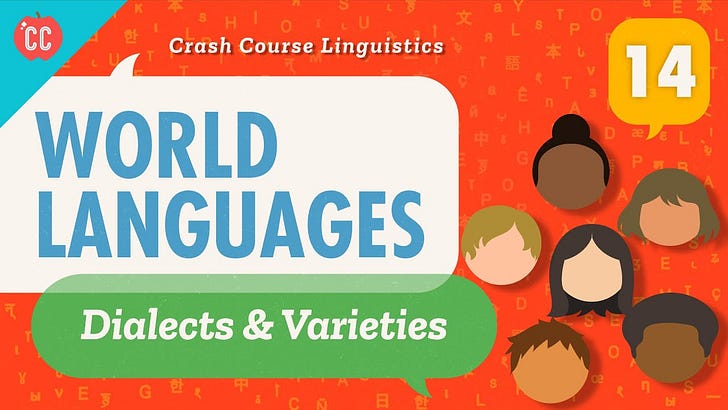Crash Course Linguistics 14 (Languages Around the World)
How many languages are there in the world?
Week 14’s Crash Course Linguistics video addresses languages around the world today, including the tricky question of what “counts” as a language.
Topics explored include language ideologies, language revitalization, and many reasons why it can be challenging to draw lines between languages. This week's Thought Bubble introduces the concept of a dialect continuum and tours several around the world. Closed captions are available in English.
By any count, there are a lot of languages, and some online databases have conveniently compiled information from separate sources. For information about genealogical relationships and bibliographies to track down further details about individual languages, check out Glottolog. For information about grammar, phonology, and many other aspects of linguistic structure, see the World Atlas of Linguistic Structures.
If you’re looking for a more personal approach, listen to Field Notes, an entire podcast about linguistic fieldwork hosted by Martha Tsutsui Billins. The podcast “aims to share the stories of linguists doing fieldwork to document, describe, and understand how languages (particularly under-described and under-documented languages) work.” Currently there are 24 episodes available, most between 20 and 40 minutes long, with transcripts available for 20 episodes so far.
For additional discussion about creating resources for a language from the ground up, listen to Making books and tools speak Chatino, a 38-minute Lingthusiasm episode interviewing Dr. Hilaria Cruz. This episode is available wherever you prefer to find podcasts, and a transcript is available here.
The International Linguistics Olympiad problem database includes a number of translation exercises involving languages that have undergone revitalization efforts, including Cree (answers here), Irish (answers here, pp. 8-9), and Māori (answers here).
Finally, see the Resource Guide we shared last spring for data, tools, and various video and audio resources about linguistic diversity, as well as past newsletters about language revitalization and linguistic field methods.
Coming next week: resources about computational linguistics!
Liz, Gretchen, and Lauren
About Mutual Intelligibility
Mutual Intelligibility is a project to connect linguistics instructors with online resources, especially as so much teaching is shifting quickly online due to current events. It's produced by Lauren Gawne and Gretchen McCulloch, with the support of our patrons on Lingthusiasm. Our editor is Liz McCullough.
Mutual Intelligibility posts will always remain free, but if you have a stable income and find that they’re reducing your stress and saving you time, we're able to fund these because of the Lingthusiasm Patreon and your contributions there.
For the 16 weeks of Crash Course Linguistics, Mutual Intelligibility will be sharing the video weekly, along with supporting resources. We will resume our regular link request and recommendations after the Crash Course Linguistics series. For more on how we usually operate, check out our about page.
If you have other comments, suggestions, or ideas of ways to help, please email mutual.intellig@gmail.com.



